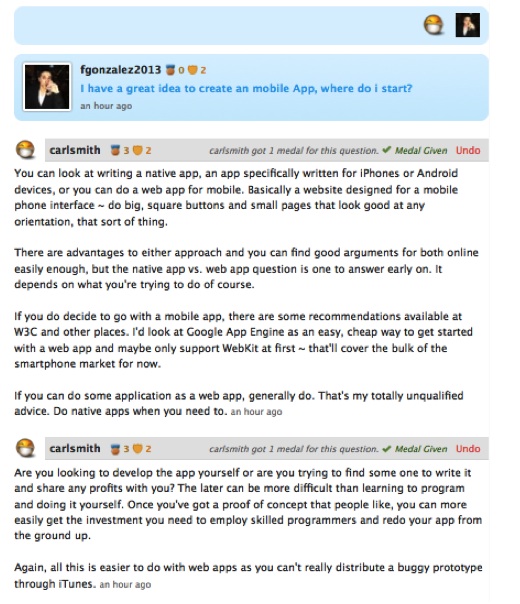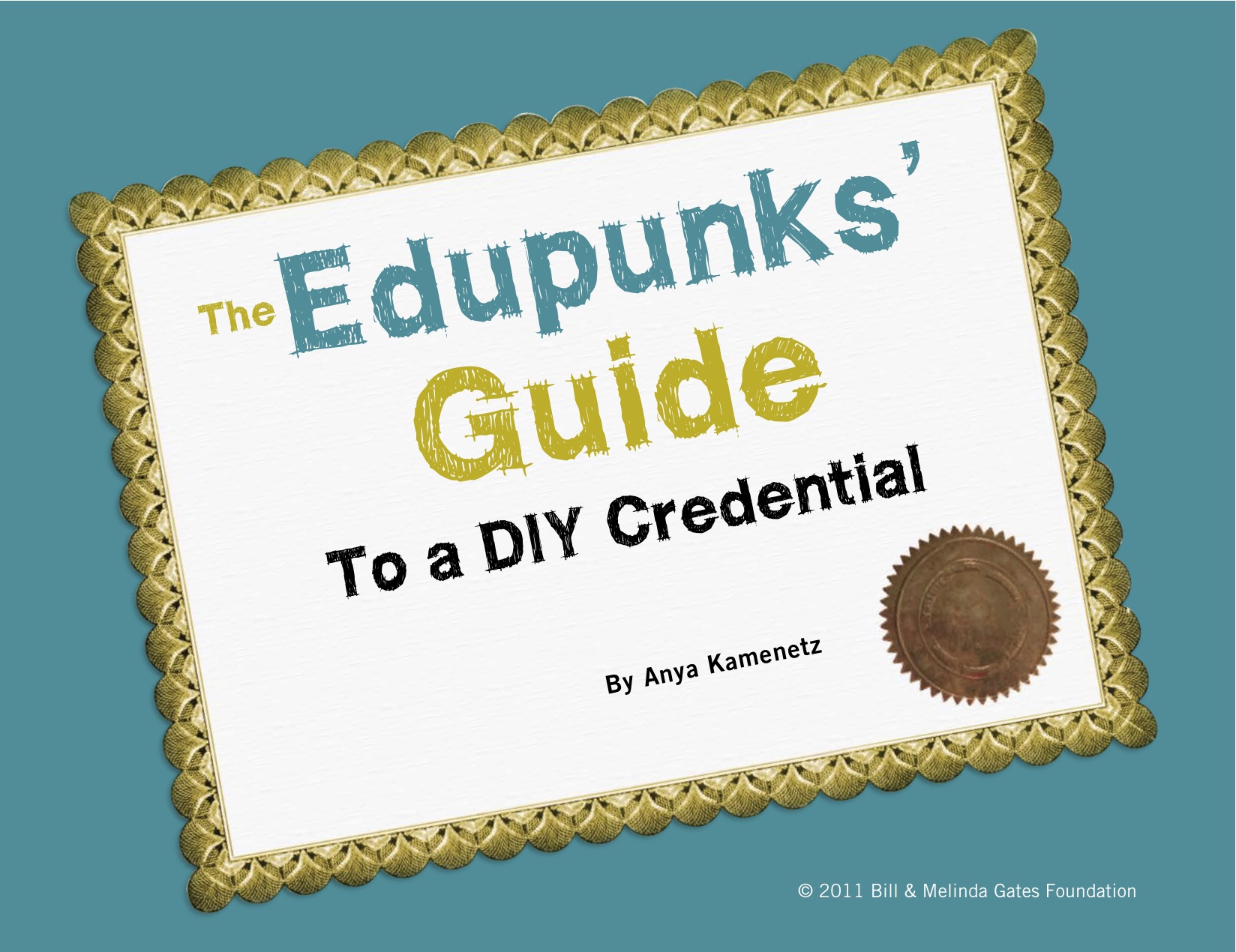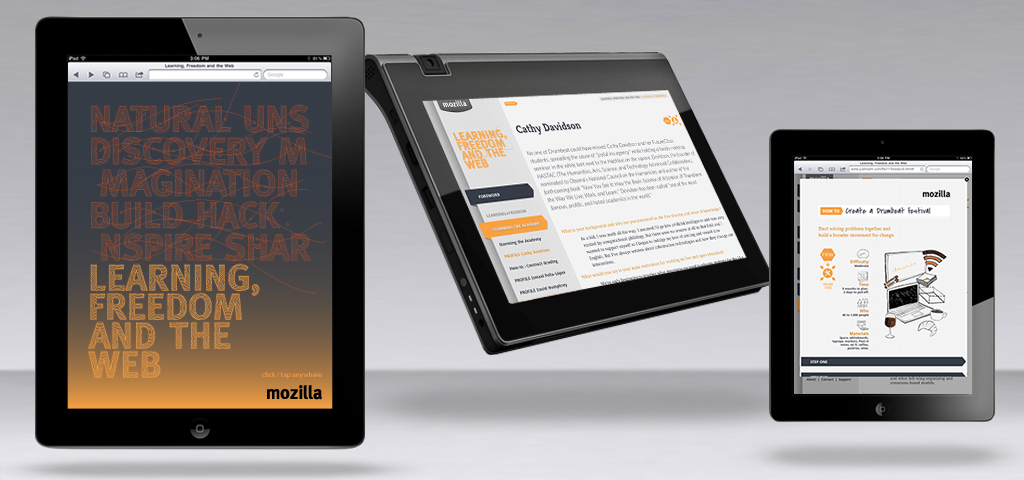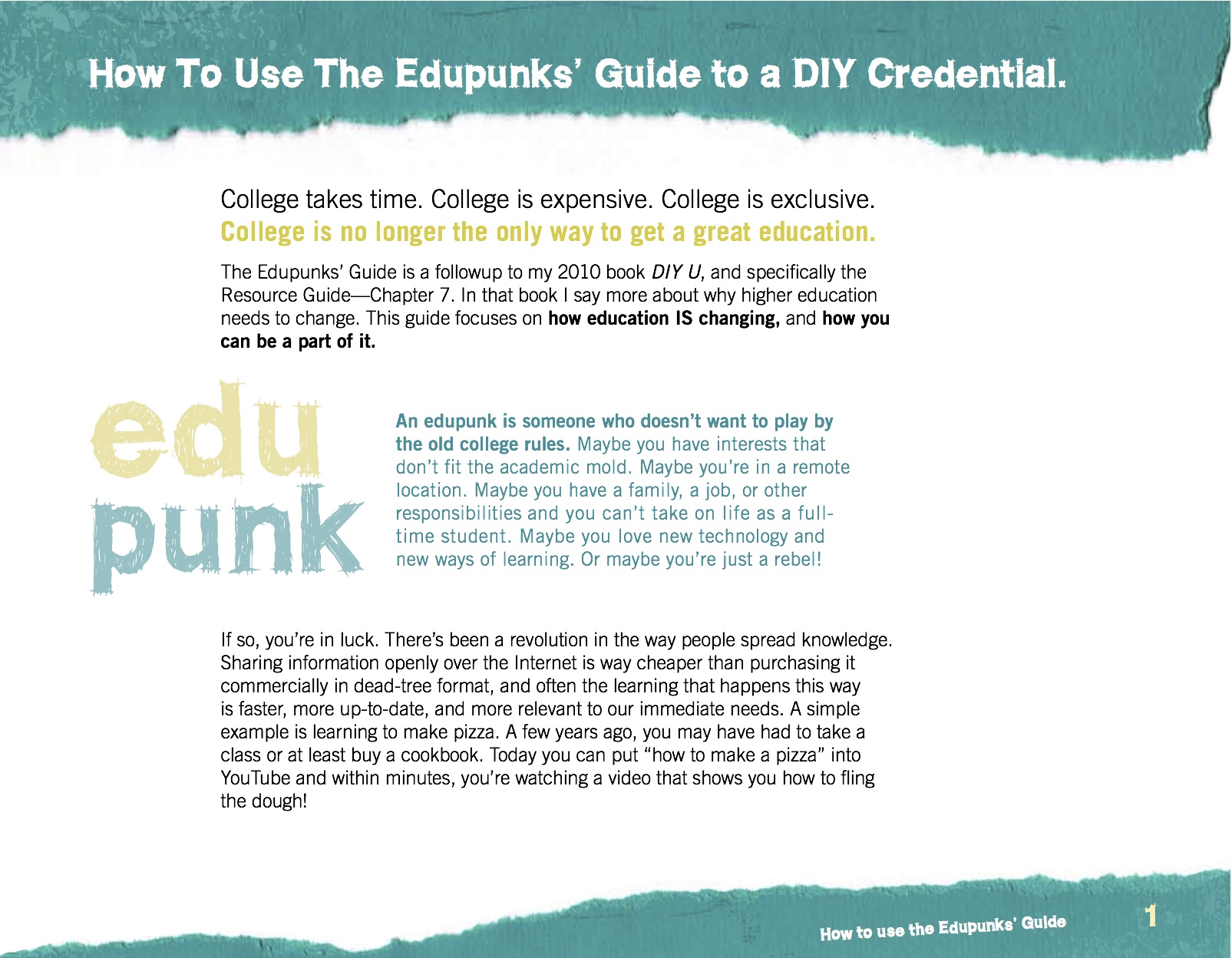Now Available for Free Download: The Edupunks’ Guide!
I’m very excited to announce that The Edupunks’ Guide is now available for free download as a nicely designed PDF and in plain-text e-reader-compatible versions. There’s also a Kindle version at Amazon.com. TheEdupunksGuide.org will launch later this fall as a site with some features that will hopefully allow people to comment on, annotate and expand the guide. For now, this blog remains the place for Edupunks’ Guide updates.
I want to thank all the readers of this blog who helped cheer on this project. I hope that you’ll find it useful. Either way, let me know what you think!
WHAT: The Edupunks’ Guide, a 100-page free ebook
WHEN:
Available for free download August 1, EdupunksGuide.org site with community features launches in September
WHO:
Anya Kamenetz, author of Generation Debt and DIY U, named a 2010 Gamechanger in Education by the Huffington Post; first book sponsored by the Gates Foundation
WHY:
A first-of-its kind resource for the future of education: a comprehensive guide to learning online and charting a personalized path to an affordable credential (or no credential) using the latest innovative tools and organizations. Real life stories and hands-on advice for today’s students, whether you’re looking at college for the first time, going back for a credential, or pursuing lifelong learning.
Highlights:
- A series of tutorials: How to Write a Personal Learning Plan, How to Teach Yourself Online, How to Build Your Personal Learning Network, How to Find a Mentor, How to Get a Credential, How To Demonstrate Value to a Network.
- The DIY Degree: A Degree At Your Own Pace (18 months to 18 years) at 81% Off Retail
- 7 Ways to Get College Credit Without Taking a College Course/7 Ways to Learn College Material Without Taking a College Course
Since way last fall I’ve been working on two follow-ups (of sorts) to DIY U and now it looks like they’ll be coming out within weeks of each other. Here’s the skinny.
I wrote and edited Learning, Freedom, and the Web in collaboration with the Mozilla community. The Mozilla Foundation threw an awesome festival in Barcelona last fall to convene and celebrate the open learning community of hackers, educators, and hacker-educators. The book contains the latest on projects that were born and brewed at that festival, like Badges (an experiment in open accreditation), Popcorn&Butter (a way of making hypervideo), and Hackasaurus (a hacking program for kids). There are lots of profiles of open-ed people like Joi Ito, Cathy Davidson, David Wiley, and more, and how-tos for people who want to try their hand at learning through making. The whole Mozilla ethos I tried to capture is showing, not telling; I think the book will be a really inspiring read for people interested in the future of education from any angle, and I hope that everyone who picks it up wants to try at least one new thing.
You will be able to pick the book up, by the way; there’ll be a handsome paper print-on-demand edition for sale, as well as a free downloadable PDF, and most exciting of all, pictured above, an Android/iPad/interactive browser app version, created by students at Emily Carr University in Canada, and also free. That version may also include video, and it’s easy to share pieces of it via Twitter/blog/whatevs. I got a preview yesterday and it’s supercool.
There’s been a lot of moving parts to this, but for sure LFW will be readable by Labor Day and hopefully before. Watch this space for the latest info.
After I turned in the manuscript for LFW, I got started straightaway on The Edupunks’ Guide. (see page 1 above). It’s currently being designed by the amazing Lisa Valuskaya and it will be available for free download by August 1.
The book is an extension of Chapter 7, the Resource Guide, in DIY U. UPDATE: it’s funded by the Gates Foundation, as the subject of this post indicates. This is a hands-on guide for today’s students, who are more and more going back to school, working, or transferring from one school to another. There are sections for people with no college experience and no set goals, people with some college experience who want a degree, and people primarily interested in open and informal learning. I interviewed about 100 learners who are all nontraditional in some way, to find out their strategies and roadblocks, and what they really need to help them succeed.
Some highlights include:
*Tutorials: How to Write a Personal Learning Plan, How to Teach Yourself Online, How to Build Your Personal Learning Network, How to Find a Mentor, How to Get a Credential, How To Demonstrate Value to a Network.
*The DIY Degree: A Degree At Your Own Pace (18 months to 18 years) at 81% Off Retail
*7 Ways to Get College Credit Without Taking a College Course/7 Ways to Learn College Material Without Taking a College Course
*Beyond MIT Open Courseware and the Khan Academy: 45 resources, networks, and organizations for open learning
In addition to a free download in the Kindle store, Google books and other places ebooks are available, by September there will be an EdupunksGuide.org website that people can contribute to and update.
The intent with this guide is to provide a practical, not an ideological definition of what edupunk can be. Most people take a DIY approach to learning because of cost and time constraints more than ideology. These are the organizations out there today that are supporting an open, more flexible, self-directed and collaborative style of learning, often at a lower cost compared to traditional institutions (and especially for-profits) or for free. And while I believe education needs to go beyond credentialism (hence the emphasis on “demonstrating value to a network”) I also recognize that right now, lots of people derive value from credentials.
So, that’s what I’ve been working on. Love to hear your feedback or questions!
Preview of New Documentary
Mike Newman is an independent filmmaker working on a critique of modern higher ed called The Elephant on Campus. I’m excited to see how it goes. This is a snippet from our interview.
The Elephant on Campus | Anya Kamenetz clip #1 from Mind Twin Media on Vimeo.
Debt Makes You Empowered? Please
Crossposted from FastCompany.com; originally written for the NYT Op-Ed page.
Debt Makes You Empowered? Please
BY Anya KamenetzWed Jun 22, 2011
A new study of people aged 18-34 published in the journal Social Science Research could have been co-authored by Sallie Mae and Citibank’s PR departments. The study found indebtedness had a positive correlation with feelings of self-esteem and mastery. The poorer the young adult, and the more credit card and student loan debt she is carrying, the more confident she feels about her life and her future, at least until age 28 when reality appears to sink in. “Debt is a resource that people can use to get the things that they want,” Rachel Dwyer, an author of the study and a sociology professor at Ohio State, told the media. A higher education and a little extra purchasing power: Priceless?
Not so much. Over the last seven years, I’ve talked to hundreds of young people whose lives have been destroyed by student loan and credit card debt. They feel betrayed, not empowered. Take the young man who went to Iraq, only to discover the fine print said the military wouldn’t pay off his private student loans from a technical school. “ “I really feel that I, as well as my parents, got screwed pretty badly. The reason I joined the army was to get rid of my loans,” he told me. My research and other surveys indicate that heavy loan burdens impel youth to move back in with their families, delay saving and planning for the future, put off starting businesses, buying homes, or starting families of their own, and fuel feelings of hopelessness. Psychologist Jean Twenge has documented record levels of anxiety and depression among current college students, who are graduating with an average $24,000 in student loans, up 6% from the year before, only to face unemployment levels upwards of 20%.
Given the facts, there are three ways to put in context the results of this study.
- Timing. The survey questions were last asked in 2004, when Angelo Mozilo, the subprime mortgage king of Countrywide Financial, was the 24th highest paid executive in the country. Our collective image of the beauty of unlimited easy credit has changed somewhat since then.
- Ignorance. Years of surveys by the State PIRGs and others show that students do not grasp the full dollar amount of their college loans, nor do they have the financial literacy on average to understand the full impact of credit card debt.
- Cognitive dissonance. Poorer young adults, especially those who take out larger loans, need to have confidence in themselves because they are taking a bigger risk. It may well be that this kind of fire in the belly leads to more borrowing, not the other way around. I’m surprised that these social scientists talk about the “effect” of debt without making any apparent attempt to tease out correlation and causation.
So if the psychological benefits of debt are flimsy at best, while the negative consequences remain scary and very real, what should we be doing to protect young people? As has been happening for a generation, the economic downturn led states to cut higher education budgets, which led to tuition increases, which led to increased borrowing. Defaults are up too. At the end of May, the Education Department took the first tentative steps toward making colleges accountable for unmanageable debt. For-profit colleges, which enroll only 12% of all college students, account for 46% of loan defaults. New “gainful employment” rules say that at least 35% of grads of a given for-profit must be earning enough to pay off their loans. It’s weak, but it’s a start. These accountability measures should be toughened and made to apply to all colleges. Colleges can innovate using technology to become more affordable, they can focus on preparing students for higher-paying careers, they can petition the states for more funding, or all three. What’s not going to work is pretending any longer that debt is an empowering gift to young people.
DIY U Video #2: Pippa Buchanan’s DIY Master’s Degree
My second DIY U video is up on FastCompany.com. You can watch it here.
I had great fun making these and I’m happy to see them making their way around the web.
Watch this space for more news soon about the Edupunks’ Guide! Coming this summer to a website near you.
New DIYU Videos Out On FastCompany.Com
You can see the first one here; there are four in all.
I’m really proud of these videos. They came about when I visited College Unbound in Providence last year and met Michael McCarthy, a student there, who was giving his midterm presentation. He had created an incredible video, partly inspired by DIY U. He didn’t know I was going to be there—it was a wonderful coincidence. I showed his work to Noah Robischon, who directs Fast Company’s website, and who had been interested in creating a DIY U video series, and the rest is history!
Mike is available for commissions, although he only takes on clients who are in line with his ideals.
Memorial Day Marketing
Kyle, who worked on the film Default: A Student Loan Documentary, set up this “Staff Picks” section at the Borders in San Francisco. 
Update: Per the comments, here are all the books (besides mine) that I can distinguish. The ones I’m familiar with and can recommend, I’ve starred.
*The Student Loan Scam, by Alan Collinge;
The Five-Year Party: How Colleges Have Given Up Educating Your Child and What You Can Do About It, by Craig Brandon
*Academically Adrift: Limited Learning on College Campuses, by Richard Arum and Josipa Roksa
Gotcha Capitalism, by Bob Sullivan
Debt-Free U, by Zac Bissonette
Higher Education? by Andrew Hacker and Claudia Dreifus
The Lost Soul of Higher Education, by Ellen Schrecker
A Chance to Make History, by Wendy Kopp
Crisis on Campus, by Mark C. Taylor
The Heart of Higher Education, by Parker J. Palmer
More On Peter Thiel and the Education Bubble
I posted on Fast Company a little bit ago debunking the idea of an education bubble. People seemed to like the post. I again posted today on Fast Company about Peter Thiel’s 20 under 20 program. Thiel, one of the most vocal advocates of the bubble, is putting his $ where his mouth is, paying 24 young and by most accounts brilliant entrepreneurs $100K to drop out of college and pursue their dreams. Lots of people read the post.
I am on an email list with some nerdy friends (a few neuroscientists, a few public interest lawyers, a few doctors, a video game artist, etc) and one asked me a bunch of questions about Thiel today so I figured these ideas continue to be of interest.
Here’s what he wrote:
Anya, can you speak to Thiel’s assertion that a college degree is no longer a surefire job guarantee? His spin on the bubble seems to be less about the whether or not education is valuable, but more about the value as it relates to, basically, working after college.
Can you also speak to his assertion that tuition rates are inflated, in part to simply look expensive and therefore valuable?
Here’s what I wrote:
-can you speak to Thiel’s assertion that a college degree is no longer a surefire job guarantee?
I would say that on average, for most people, a college degree is still a necessary, but not by any means sufficient, qualification for a decent job.
The *relative* return on a college degree is substantial, but its growth since the 1970s is due to the downturn in incomes among those who do NOT have a college degree. (AKA: I’m not any taller than I used to be, but my sister shrank, so the difference between our heights is more)
The bitter pill to swallow is that while the return on college has failed to increase in a generation, the cost of college has grown substantially–is now saddling 66% of graduates with average $24K in student loan debt. So college is a much worse deal now for more people than it was when Peter Thiel graduated from college.
And yes, I absolutely agree with him that college tuition is overinflated for a million reasons. (DIY U Chapter 3 if you’re curious, or you can flip through this slide deck )
All of this is intensified in the current recession, which is bringing historically high unemployment rates for college grads. The Times reports about a fifth of recent grads are unemployed and another fifth are working in jobs that don’t require a degree.
Yet since the education demands in our economy continue to rise,(David Autor at MIT is good on this topic, or the Georgetown Center on Education and the W0rkforce) it doesn’t follow that college is going to go by the wayside. What I see happening instead is increasing pressure on the marketplace to produce affordable quality forms of college–http://www.straighterline.com/ is a pioneer–and more intriguingly, the emergence of more specific, practical, modular forms of qualification for careers that combine some aspects of assessment, portfolio, and reputation based networks. Github and Behance are the two examples I always use.
Online Classes As Cash Cows
Found this column interesting in the Chronicle, although for different reasons than the author does. Rob Jenkins points out that success rates in online college courses tend to be lower than those in face to face courses (he mentions but does not cite studies of 50% vs. 70-75% success rates). Doesn’t that make sense if, as he points out, online courses are often harder than their f2f equivalent? They require more reading, more writing, more self-motivation, and they build technical skills along with the skills covered in the class.
Then again, don’t understand how online courses can be more difficult in one part of this essay, and lacking in quality in another part (he refers snidely t0 the practice of teaching anatomy online. I guess he’s never seen this.)
I disagree that the answer is to screen students to determine if they have the chops to succeed online. I think what colleges should do is constantly refine and improve online course design. Adaptive learning software makes this easier than ever. They should add hybrid elements where appropriate, which don’t necessarily have to take place in a classroom. Jenkins gives a great example of this: an online speech course where students must go out and give a speech to their church, community group, or other real-world setting. Evidence, not prejudice, should determine the development of online vs. f2f courses. In truth, what we’re really talking about is online vs. hybrid courses, as it’s rare to find a course that doesn’t have an online component, whether the syllabus on a web page or the ability to connect with professors via email.
The other troubling fact in the piece is when Jenkins mentions that online courses have become a “cash cow”: “colleges can produce online courses much more cheaply while charging roughly the same tuition.”
THAT’s outrageous. Students deserve to pay something closer to the true cost of their educations. Price gouging by a publicly supported institution is unattractive and unethical.
PS: Check out this great article by the founder of Techchange (and a professor) on up to the minute tools for teaching hybrid courses.
Social Learning Test Drive for Edupunk Book, Part 2
Part 1 is here.
 In the afternoon our College Unbound User Test Day really got interesting. We were testing and modeling some different methods of social learning. One of my goals with this book is to spell out the steps of some implicit processes and heuristics–rules of thumb–that successful learners have developed for learning online, so that everyone knows how to do them. There are all kinds of courses on “study skills” for traditional class and testing formats, but when it’s time to go beyond highlighters and notebooks into the virtual world, we are operating without a safety net.
In the afternoon our College Unbound User Test Day really got interesting. We were testing and modeling some different methods of social learning. One of my goals with this book is to spell out the steps of some implicit processes and heuristics–rules of thumb–that successful learners have developed for learning online, so that everyone knows how to do them. There are all kinds of courses on “study skills” for traditional class and testing formats, but when it’s time to go beyond highlighters and notebooks into the virtual world, we are operating without a safety net.
So first, Mike McCarthy walked us through his use of P2PU study groups. P2PU of course is the free peer-to-peer online university. In addition to their classes, they’ve been experimenting with a program called Lernanta to allow people to form study groups over common interests. Mike’s been using it to improve his skills with video. He also joined an open book group that is, fittingly, reading Ivan Ilich’s Deschooling Society.
Study groups are really important. They bring the social element back into learning online. They can provide motivation and a means of self-testing. Lots of research shows the importance of collaborative study in conventional learning settings, for motivation, encouragement, and “elaboration” of learning.
However, we couldn’t form or join an effective online study group in an afternoon. So I asked the students to go to a bunch of different sites and post a question that was relevant to their studies. I then encouraged them to look through the questions already posted and see if they could answer anything.
Ask Metafilter- this online community, I didn’t realize, charges $5 for joining plus a week long waiting period. However, some students still enjoyed searching through the existing questions&answers. “On Metafilter I read ‘What is the moral obligation that the wealthy have toward the less well off?’” reported Talia. “There were good points on both sides. I really enjoyed seeing different people’s perspectives.”
Quora – also good for philosophical discussions, but a bit harder to search.
Twitter – Twitter is one of the best places to build a learning community online. But it takes time to build. I had the students ask a question to my Twitter followers, and we got some good answers back. We also coached them through searching hashtags to find relevant information, and @-replying someone to make sure they see your question. Despite the lack of instant gratification, half the students took the initiative to open Twitter accounts for the first time, and they seemed to get the hang of following people who matched their interests. Twitter’s suggestions help.
OpenStudy- This was the students’ favorite site for asking and answering questions. Freddy, whose conversation is listed above, was the first to call out, “I’m getting an answer!” There’s a large robust community on it and helpful answers were almost instant. The answers and groups are organized around topics, which can be hard to find or hard to understand sometimes. It might be a good idea to form your own group if you have a topic of interest that’s not represented here.
Wikianswers Yahoo! Answers these two are more superficial, though helpful for some practical queries.
Google www.google.com –When all else fails, you can always Google your question. Harry figured out the trick of Googling his question plus the word “forum” to find out if it had been asked on a message board. There are hundreds of these around the Internet on every imaginable topic.




